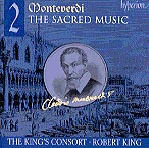As the sound of choir and instruments fills the room at the opening of Exultent caeli, you can appreciate that this truly is a moment of exultant heavens and joyful angels. As the piece suddenly transforms to a dialogue among soloists, we’re willingly drawn to reflect on the event of Mary’s annunciation, and the section ends in a moment of tender reverence before returning to the grandeur of the beginning. So in less than four minutes Monteverdi effectively carries us from heavenly celebration to earthly contemplation of a holy miracle and back to heaven again, and it would be hard to imagine the music better realized than by the superb singers and instrumentalists of The King’s Consort. As in Volume 1 (for a review, type Q7420 in Search Reviews), the performances are never less than “splendid” and the sound is “vibrant”–full and clear in the tuttis and well-balanced in all vocal/instrumental configurations.
Again, the repertoire is not likely to be familiar to most listeners–the Vespers and some madrigals seem to get all the attention–and while it’s not all equally compelling (the solo-tenor motet Currite populi is uninterestingly repetitive if well-sung by James Gilchrist)–the mass is of the highest caliber, with an especially lovely Agnus Dei (among the most beautiful settings anywhere) and a rousing Gloria. The rest of the program consists of solo and two-voice motets (some highly ornamented) and concludes with a Litany of the Blessed Virgin for six soloists, choir, and instruments. It’s a grand, melodious, harmonically rich work with plenty of interaction among soloists and big moments for the choir. On evidence of the two volumes we’ve heard so far, there are simply no finer Monteverdi practitioners around these days–one glance at the list of singers (including the choir) and instrumentalists will tell you why!–and credit must go to Robert King for intelligent, stylish performances that not only enliven the music but enlighten listeners. On to Volume 3! [10/29/2004]
































